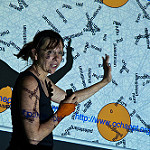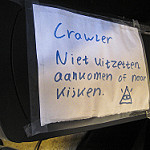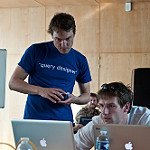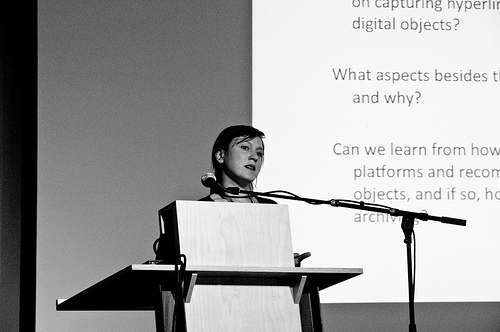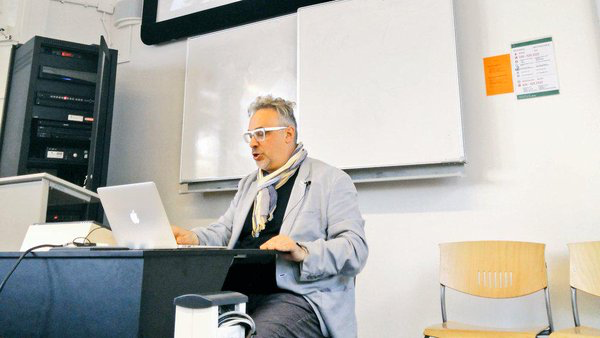Digital Methods Summer School 2021
Fake everything: Social media's struggles with inauthentic activities
Project write-ups
Please make a project page wiki, and add your project write-up. Here is an example, https://wiki.digitalmethods.net/Dmi/WinterSchool2019Normiefication. You can place multiple sub-projects into one wiki report, or you can create a set of subprojects, e.g., https://wiki.digitalmethods.net/Dmi/WinterSchool2019FakingNews. Practically speaking, to create a project page, make a wiki page such as https://wiki.digitalmethods.net/Dmi/WinterSchool2021QAnon by typing such a URL (please note the URL syntax - /Dmi/WinterSchool2021 followed by shortened project name). Then create the page. If you do not have a DMI wiki account, create one. When you try to edit a page, you'll be asked to log in, at which point you can create an account. Account creation is now enabled. Please link your wiki (by editing this page) to the respective project title below. You also can edit the project title. 1. Detecting Conspiratorial Hermeneutics via Words & Images 2. Mapping the Dutchophone Fringe on Telegram 3. Greenwashing, in_authenticity & protest 4. Searching constructive/authentic posts in media comment sections: NU.nl/The Guardian 5. Mapping deepfakes with digital methods and visual analytics 6. “Go back to plebbit”: Mapping the platform antagonism between 4chan and Reddit 7. Profiling Bolsobots Networks5 - 16 July 2021
Online via ZoomNew Media & Digital Culture
University of Amsterdam
Turfdraagsterpad 9
1012 XT Amsterdam
the Netherlands Summer School Theme Fake everything: Social media’s struggle with inauthentic activities This year’s Summer School has as its theme the so-called ‘faking’ and detecting of inauthentic users, metrics and content on social media. The uptick in attention to the study of the fake online could be attributed in the first instance to the ‘fake news crisis’ of 2016, where it was found that so-called fake news outperformed mainstream news on Facebook in the run-up to the U.S. presidential elections that year. That finding also set in motion the subsequent struggle around the occupation of the term from a type of news originating from imposter media organisations or other dubious sources to a ‘populist’ charge against mainstream and elite media that seeks to delegitimate sources found publishing inconvenient or displeasing stories. In its study we have had calls to cease using the term, fake news. There also has been a variety of classification strategies. Both the expansion as well as contraction of the term may be seen in its reconceptualisation by scholars as well as by the platforms themselves. The definitional evolution is embodied in such phrasings as ‘junk news’ and ‘problematic information’, which are broader in their classification, whilst the platforms appear to prefer the terms ‘false’ (Facebook) or ‘misleading’ (Twitter), which are narrower.
On the backend the platform companies also develop responses to fake activities. They would like to automate as well as outsource its detection and policing, be it through low-wage content moderators, volunteer fact-checking outfits or user-centred collaborative filtering such as Twitter’s ‘birdwatchers’, an initiative they say born of societal distaste for a central decision-making authority, found through qualitative interviews. They also take major decisions to label content by world leaders (and indeed have world leader content policies), which subsequently lands platform decision-making in the spotlight. More broadly there has been a rise in the study of ‘computational propaganda’ and ‘artificial amplification’ which the platforms refer to as ‘inauthentic behaviour’. These may take the form of bots or trolls; they may be ‘coordinated’ by ‘troll armies’, which has been outlined in Facebook’s regular ‘coordinated inauthentic behaviour reports’. As its head of security policy puts it, Facebook defines it (in a roomy and plainspeak manner) as ‘people or pages working together to mislead others about who they are or what they are doing’. Occasionally data sets become available (by Twitter or other researchers) that purport to be collections of tweets by these inauthentic, coordinated campaigners, whereupon scholars (among other efforts) seek to make sense of which signals can be employed to detect them. Other types of individuals online also have caught the attention of the platforms as ‘dangerous’ (Facebook), and have been deplatformed, a somewhat drastic step that follows (repeated) violations of platform rules and presumably temporary suspensions. ‘Demonetisation’ also is among the platforms’ repertoire of actions, should these individuals, such as extreme internet celebrities, be turning vitriol into revenue, though there is also the question of which advertisers attach themselves (knowingly or not) to such content. Moreover, there are questions about why certain channels have been demonetised for being 'extremist'. On the interface, where the metrics are concerned, there may be follower factories behind high follower and like counts. The marketing industry dedicated to social listening as well as computational researchers have arrived at a series of rules of thumb as well as signal processing that aid in the flagging or detection of the inauthentic. Just as sudden rises in follower counts might indicate bought followers, a sudden decline suggests a platform ‘purge’ of them. Perhaps more expensive followers gradually populate an account, making it appear natural. Indeed, there is the question of which kinds of (purchased) followers are ‘good enough’ to count and be counted. What is the minimum amount of grooming? Can it be automated or is there always some human touch? Finally, there is a hierarchy in the industry, where Instagram followers are the most sought after, but ‘influencers’ (who market wares there) are often contractually bound to promise that they have not ‘participated in comment pods (group 'liking' pacts), botting (automated interactions), or purchasing fake followers'.
Important links
- Call for participation and general information: https://bit.ly/dmi21-ss-call
- Welcome Package: https://bit.ly/dmi21-ss-welcomepack. Contents: Welcome note, day-to-day schedule and other materials.
- The welcome package folder: https://bit.ly/dmi21-ss-wpfolder. Contents: the reader, face book, and other linked documents.
- Project descriptions to be pitched on the opening day: https://bit.ly/dmi21-ss-projects
- The reader: https://bit.ly/dmi21-ss-reader
- Tutorials: http://bit.ly/dmi21-ss-Tutorials and the Tutorials schedule: https://bit.ly/dmi21-ss-tutorial-schedule
- G-doc template for project reports: https://bit.ly/dmi21-ss-gdoc-template. And Wiki template: http://bit.ly/dmi21-ss-template-wiki
- Templates for EIT participants: Final report template: http://bit.ly/dmi21-ss-eitReportTemplate. Final presentation template: http://bit.ly/dmi21-ss-eitPresentationTemplate
- Collaborative note taking for Keynotes: https://bit.ly/dmi21-ss-QandA
- The Face Book of international participants: https://bit.ly/dami21-ss-facebook
- Official hashtag: #dmi21 and #eitdigitalsummerschool
- Slack Channel: dmi2021.slack.com. Link to join: http://bit.ly/dmi2021-SlackInvite.
- Folder with slides: https://bit.ly/dmi20-ss-slidesfolder.
Summer School Philosophy
The Digital Methods Summer School is exploratory and experimental. It is not a setting for ‘just’ tool training or for principally tool-driven research. Substantive research projects are conceived and carried out. Participants are encouraged to ‘span time with their issue’ and the materials. In other words, we heed Alexander Galloway’s admonition about data and tool-driven work: “Those who were formerly scholars or experts in a certain area are now recast as mere tool users beholden to the affordances of the tool — while students spend ever more time mastering menus and buttons, becoming literate in a digital device rather than a literary corpus.”[1] We encourage device and corpus literacy! The device training we ask you to do prior to the Summer School through online tutorials, and at the Summer School itself, in a kind of flipped learning environment (if you'll excuse the overused phrase), we would like to believe that you have familiarised yourself already with the tools (and are driven, to complete the thought). During the Summer School we will discuss and tinker with the nitty-gritty, aim to invent new methods, techniques and heuristics and create the first iterations of compelling work to be shared. [1] Alexander Galloway (2014)." The Cybernetic Hypothesis," Differences. 25(1):107-131. See page 127.About "Digital Methods" as Concept
Digital methods is a term coined as a counter-point to virtual methods, which typically digitize existing methods and port them onto the Web. Digital methods, contrariwise, seek to learn from the methods built into the dominant devices online, and repurpose them for social and cultural research. That is, the challenge is to study both the info-web as well as the social web with the tools that organize them. There is a general protocol to digital methods. At the outset stock is taken of the natively digital objects that are available (links, tags, threads, etc.) and how devices such as search engines make use of them. Can the device techniques be repurposed, for example by remixing the digital objects they take as inputs? Once findings are made with online data, where to ground them? Is the baseline still the offline, or are findings to be grounded in more online data? Taking up these questions more theoretically (but also practically) there is also a Digital Methods book (MIT Press, 2013) as well as a complementary Issue Mapping book (Amsterdam University Press, 2015). Doing Digital Methods (Sage, 2019) contains teaching materials.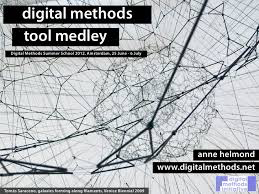
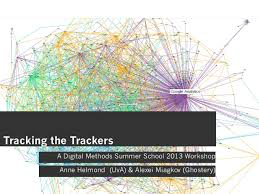
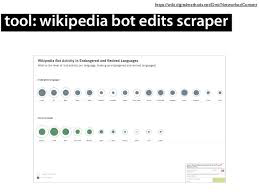
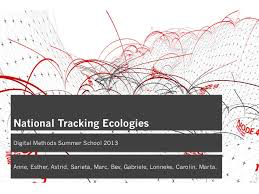
About the Summer School
The Digital Methods Summer School, founded in 2007 together with the Digital Methods Initiative, is directed by Professor Richard Rogers, Chair in New Media & Digital Culture and Department Chair at Media Studies, University of Amsterdam. The Summer School is one training opportunity provided by the Digital Methods Initiative (DMI). DMI also has a Winter School, held the first week of January. Both Schools have a technical staff as well as a design staff, drawn from the ranks of Density Design in Milan. The Schools also rely on a technical infrastructure of servers hosting tools and storing data.In a culture of experimentation and skill-sharing, participants bring or log on with their laptops, learn method, undertake research projects, make reports, tools and graphics and write them up on the Digital Methods wiki. The Summer School concludes with final presentations. Often there are subject matter experts from non-governmental or other organizations who present their analytical needs and issues at the outset and the projects seek to meet those needs, however indirectly. Please see previous Digital Methods Summer Schools, 2007-2020. See also previous Digital Methods Winter Schools, 2009-2021. The Digital Methods Initiative was founded with a grant from the Piet Mondriaan Foundation, the public cultural funding organization. The Digital Methods Summer and Winter Schools are self-sustaining.
Applications
To apply for the Digital Methods Summer School 2021, please send a one-page letter explaining how digital methods training would benefit your current work, and also enclose a CV (with full postal address), a headshot photo as well as a 100-word bio. Mark your application "DMI Training Certificate Program," and send to summerschool [at] digitalmethods.net. We have rolling admissions which means that you will be notified within a few days of receiving your application. We will accept applications until 5 May 2021. Any questions may be addressed to the Summer School coordinators, summerschool [at] digitalmethods.net. Informal queries may be sent to the email address as well. The Summer School costs EUR 895. Accepted applicants will be informed of the bank transfer details upon notice of acceptance to the Summer School. The fee must be paid by 11 June. University of Amsterdam students are exempt from tuition. Members of Dutch research schools pay half tuition.Successful Completion and Completion Certificates (including ECTS credits)
To successfully complete the Summer School and receive a Completion Certificate (and ECTS credits), you must complete a significant contribution to the Summer School project, evidenced by co-authorship of the project report as well as final (joint) presentation. Templates for the project report as well as for the presentation slides are supplied.Schedule
The Summer School meets every weekday. We start generally at 9:15 in the morning, and end around 5:30. There are morning talks at the beginning of each week, followed by hands-on tutorials. All other time is devoted to project work with occasional collective and individual feedback sessions. On the last Friday we have a festive closing.Preparations: Online Tutorials
For your Summer School to be especially successful we would recommend highly that you watch (or listen to) the Digital Methods tutorials. The DMI YouTube channel has copious materials, and we would very much like for you to watch the social media tool tutorials.Social Media & Participant Face Book
Twitter hashtag #dmi21We shall have a list of summer school participants and make an old-fashioned Face Book with the headshots and bio's you send to us. We look forward to welcoming you to the Digital Methods Summer School!
EU Project
The Summer School is part of the EU Project, CLEOPATRA as well as EIT Digital.Edit | Attach | Print version | History: r24 < r23 < r22 < r21 | Backlinks | View wiki text | Edit wiki text | More topic actions
Topic revision: r24 - 09 Aug 2021, SalUva
 Copyright © by the contributing authors. All material on this collaboration platform is the property of the contributing authors.
Copyright © by the contributing authors. All material on this collaboration platform is the property of the contributing authors. Ideas, requests, problems regarding Foswiki? Send feedback
